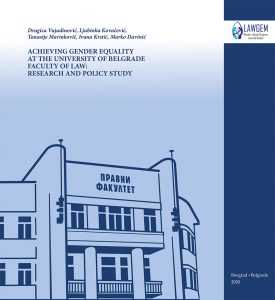 |
Dragica Vujadinović, Ljubinka Kovačević, Tanasije Marinković, Ivana Krstić, Marko Davinić, Achieving Gender Equality at the University of Belgrade Faculty of Law: Research and Policy Study University of Belgrade Faculty of Law, Belgrade, 2020, ISBN 978-86-7630-939-9. E-Book in English (PDF)E-Book in Serbian (PDF) |
The research and policy study Achieving Gender Equality at the University of Belgrade Faculty of Law is the result of the continuous systemic work of the research team of the Centre for Human Rights at the University of Belgrade Faculty of Law on the document titled Draft Action Plan for Achieving Gender Equality at the University of Belgrade Faculty of Law. The main aim is for this document to first be officially approved by the University of Belgrade Faculty of Law administration and then to be applied for the continuous and systematic promotion of the gender equality and its implementation at the Faculty.
Group of authors (Dragica Vujadinović, Ljubinka Kovačević, Tanasije Marinković, Ivana Krstić and Marko Davinić) collected and analysed statistical data of relevance for the implementation of the gender equality principles at the University of Belgrade Faculty of Law. The data is related to the gender structure of the students who enrolled and graduated from undergraduate and other studies at the Faculty, to the gender structure of the employees and participants in the competitions for promotion to higher academic rank, average period of keeping on the same professional rank and the differences between men and women in this regard, then to the gender pay gap, and gender structure of the Faculty administration. Furthermore, the empirical survey included also the analysis of data collected on the basis of the questionnaire about the value statements of the Faculty academic staff, as well as their assessment of the state of affairs and understanding of different aspects of gender equality. The members of the research team also scrutinized and critically investigated the applicable sources of international and domestic law, and studied a large number of gender action plans and strategies for achieving gender equality at universities abroad, as well as their regulations and strategies for preventing and protection against sexual harassment of students and employees. Based on these insights, the members of the research team elaborated the Draft Action Plan for Achieving Gender Equality at the University of Belgrade Faculty of Law, with proposed measure related to: 1) legal and institutional-organizational framework (establishing a Faculty Commissioner for Equality and confidential counsellors; analysis and critical reassessment and amendment of general acts of the University of Belgrade Faculty of Law with the aim of creating conditions for achieving gender equality; gender balance in hiring academic staff; improving the protection against discrimination of the persons who conduct expert, administrative and technical jobs; creating of conditions for efficient reconciliation of employees’ professional and family duties; support for students with family duties); 2) educational framework (introducing obligatory instruction on the principles and values of gender equality and the struggle against discrimination and sexual harassment; reassessment of the study programmes, syllabi and textbooks for particular courses from the gender perspective); 3) cultural framework (investigating the scale of gender-based stereotypes and prejudices /scale of sexism/, and the elements of the patriarchal matrix; struggle against particular forms of sexual and other harassment of students and employees). The Achieving Gender Equality at the University of Belgrade Faculty of Law: Research and Policy Study publication presents two main parts of the draft gender action plan: the narrative part and the tabular part. There are also annexes related to the Draft Regulation on the Prevention of and Protection Against Sexual Harassment at the University of Belgrade Faculty of Law, and IBM SPSS Statitstics 23.o. analysis tables, which support the presented views in the case of particular questions from the Questionnaire about the existence of statistically significant differences.

